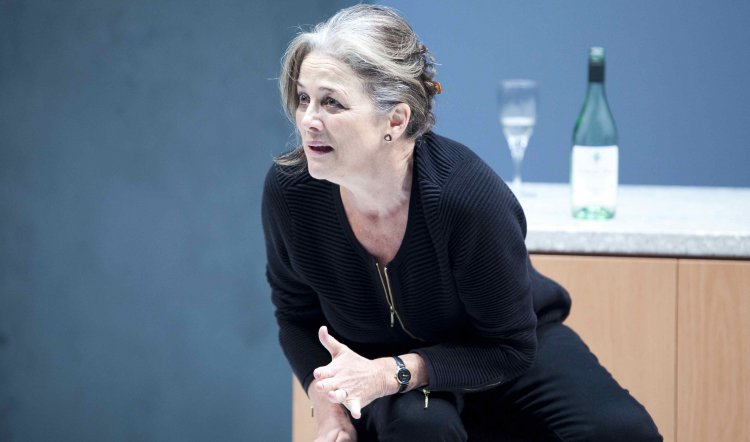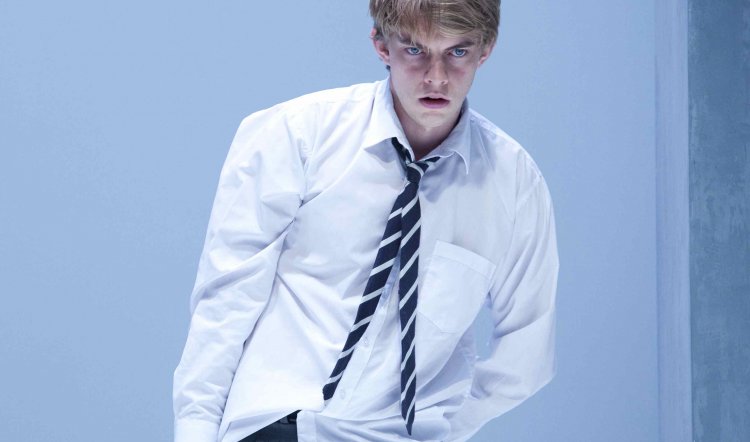
FURY
FURY, Sydney Theatre Company at Wharf 1, April 20-June 8, 2013. Photos by Lisa Tomasetti: Sarah Peirse and, right, Harry Greenwood.
Joanna Murray-Smith's interest in and exploration of the yin and yang of human beings and their relationships with one another has made her one of our most successful and popular playwrights, albeit one whose work has been hard to find in Sydney in recent years. That's all changed now and apparently Murray-Smith is already talking to STC's artistic director Andrew Upton about a new commission for next year.
Meanwhile, Fury is not only about the human emotion of the title but also about a fictitious radical student political organisation that has a whiff of being a cross between The Push and Ananda Marga. And it's also about the fine lines between success and failure and expectation and reality.
Alice (Sarah Peirse) is a neuroscientist whose work has just landed her "a big prize". Either through inadmissible ego or, she would surely rather believe, innate good nature she has agreed to be interviewed and profiled by Rebecca, a student journalist (Geraldine Hakewill). The tyro investigative reporter's search for meaning also includes Alice's husband, critically acclaimed if not bestselling novelist Patrick (Robert Menzies). In the first half all is going well in the kind of lightly confected, rapid-fire exchanges of witticisms, savvy one-liners and deeper moments that characterise Murray-Smith's method. It's not rocket science: lull them into cosy compliance and complicity then, when they're chortling happily: whack 'em with some big and uncomfortable ideas, but she does it so well, she'll trap you every time.
In this instance it's Alice and Patrick who are trapped - by the past and by the fragility and unreliability of their own beliefs and images of each other. When you've spent your adult life striving to be "good" it has to come as a horrible shock to be reminded that you weren't always. Similarly, when you've spent your young life in the shadow of good and successful parents it's possibly an even bigger shock to realise your attempt at rebelliously bad behaviour actually reveals their profound lack of a moral compass.
To their shock and horror they discover that their teenage son Joe (Harry Greenwood) has been up to no good. Worse than that, they learn of his behaviour from a lesser being - his teacher (Tahki Saul) - and then have to endure the humiliation of discovering that it was he and not his blue collar scholarship boy mate who was the instigator of the crime. And his rough and ready parents (Claire Jones and Yure Covich) tell them so point blank.
It's quickly clear that Alice and Patrick would have preferred their son be trawled up in a drug bust than to have done the thing he's accused of (and yes, there's CCTV footage and no possibility of mistaken identity). And its a dilemma that must be faced by so many determinedly decent, politically liberal and culturally splendid people: your son has graffitied a mosque. It could probably only be worse if he were revealed as a kiddy fiddler.
There's an added twist of cruel fate in that the two parents, whose work is about questioning and answering questions, in that when asked "why?" Joe shrugs his surly, teenage shoulders and doesn't have a clue. The irony is both bitter and funny. But what is further revealed, however, is more than that. Gradually Alice's carefully constructed, well researched and morally golden world begins to collapse and, although she starts off smug and sure, her disintegration is ultimately painfully sad.

The play pivots around Alice, although the real story is Joe's and both Sarah Peirse and Harry Greenwood are tremendous in their roles. Alice's bewilderment and rage are expressed to her son in two beautifully worded sentences: "There is something very very wrong with you. There is something not right." The precision is everything here: Alice is a scientist and not given to excess or hyperbole. To vehemently repeat "very" is more meaningful than an ordinary mortal saying "totally totally". And then for her to further qualify her disquiet by turning her thoughts around underlines the depths of her bafflement. And baffled is something Alice is not at ease with.
Extremely recent NIDA graduate Harry Greenwood makes a shambling, awkward, fierce and fragile masterpiece of the boy-man Joe. He is at once sullen and suffering, adored by his parents and invisible to them too. In many ways he's Everyboy. As his friend's parents Claire Jones and Yure Covich make the most of what are really extended cameos rather than support roles. Their sure working class confidence is in bright contrast to the uneasy superiority of the successful intellectuals - both sourly funny and sharp. The journalist and the school teacher are neither around long enough nor sufficiently three-dimensional to do more than propel the action on its way, which they do extremely well.
The sparkling and intelligent production, directed with panache by Andrew Upton, is designed by David Fleischer as an edgy abstract space of grey slabs and expensive flooring (lighting by Nick Schlieper and Chris Twynam) that says a great deal about middle class success and how it might perceive itself. During an hour and 40 minutes straight through, the choreography of the chairs and a sort of Beidermeier credenza mark the changing fortunes and emotions effectively and without fuss.
The only flat note is Robert Menzies as the novelist. I have to admit right here that I just don't get him as an actor anyway and am entirely unconvinced by him here. His delivery is always exactly the same no matter what the play or the role might be. The intensity and twitchy body are a constant and rarely meaningful. It's as if he can't hear or doesn't understand what he's saying so the violent emphasis on one word or another is senseless and bizarre - like the inner autocue isn't working properly. The end result is almost always false and jarring - and here, where the actress opposite him is so fine - it's awfully uncomfortable, chalk on a blackboard stuff.
Nevertheless, Fury is entertaining, funny, moving and clever. It raises some curly questions and spectres that might not occur until later, but one thought that lingers is the awkward lingering thought that once you know something you can't unknow it. And that's probably the worst knowing of all.



